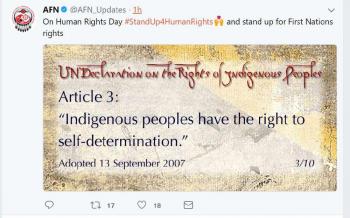Summary
By Deb Steel
Windspeaker.com Writer
The Assembly of First Nation has taken the opportunity today—Human Rights Day—to remind its social media followers that Article 3 of the United Nations Declaration on the Rights of Indigenous Peoples states that Indigenous Peoples have the right to self-determination.
Indeed, Justice Minister Jody Wilson-Raybould emphasized the necessity of Indigenous nations in Canada to “self-determine in order to re-build.”
And the work ahead for first peoples, she stressed, will not be simple or easy. It will require a time of self-reflection first to answer hard questions, she told the chiefs gathered at the Assembly of First Nations Special Assembly in Ottawa Dec. 5. “No Crown government or anyone can lead this work for you.”
The first of such hard questions may be how Indigenous peoples will organize into the future, she said.
“Part of the work of self determination is figuring out how each traditional rights-bearing collective will work and govern together in protecting their cultural ways of life, lands, resources and societies.”
This statement comes on the heels of those made by former prime minister Paul Martin and former Ontario premier Bob Rae during a presentation Nov. 27 at the Nation-to Nation National Summit also in Ottawa.
Martin said Indigenous peoples had a responsibility to determine how many nations there are. “I know there’s a huge debate of the number,” he said.
Is it 58 as the National Chief Perry Bellegarde told the summit gathering, or 85 or 633 nations across the country?
Rae said “within the First Nations communities there has to be a really serious discussion about what are the effective units of governance that are actually going to take us forward?... We don’t have the effective units of governance in place to do the nation-to-nation work that needs to be done.”
Rae said one of the worst things that the Indian Act has done was to confuse tiny units with the term ‘nation’ in the nation to nation relationship. Wilson-Raybould told the chiefs that the Indian Act and the imposition of band councils has “impoverished the notion of governance” and that must be addressed.
Minister of Crown-Indigenous Relations and Northern Affairs Carolyn Bennett also talked about her department’s focus on “reconstituting nations” to accelerate progress towards self-determination.
At the AFN special assembly Bennett quoted from Volume II of the 20-year-old Royal Commission on Aboriginal Peoples report with a statement from Regina Crowchild, who at the time was president of the Indian Association of Alberta.
“When our peoples entered into treaties, there were nations of peoples. And, people always wonder why, what is a nation?... They had their own languages. They had their own spiritual practises. They had their own political institutions. They had the land base and they possessed historic continuity on this land base.”
The second paragraph of that quote, which Bennett didn’t fully state in her speech is:
“Within these structures, they were able to enter into treaties amongst themselves as different tribes, as different nations on this land. In that capacity they entered into treaty with British people. So these treaties were entered into on a nation to nation basis. That treaty set out for us what our relationship will be with the British Crown and her successive governments.”
At the Nation-to-Nation National Summit on Nov. 28, former AFN national chief Ovide Mercredi said “Canadians have to understand that when we say nation we are not talking about our communities.” He said Indigenous communities are where Indigenous people live. “Their nation is the identity of their people and the culture of their people, the language of their people. The territory of their people—the Nisga’a Nation, the Sto:lo Nation, the Cree Nation in Alberta…
“Canadians should not be concerned about having 630 nations… We are not talking in that language. And even if we were, so what? But we know that’s not what it’s going to be.”
With Bill C-262 introduced in the House of Commons for second reading Dec. 5, an act to ensure that all Canadian laws are consistent with the UN Declaration on the Rights of Indigenous peoples, Wilson-Raybould said the Indian Act cannot survive the Declaration because “it is the antithesis of self-determination.”
Bennett said Canada and the nations needed to work together to design a framework “in which inherent and treaty rights be protected outside the straight jacket of the Indian Act.”
Much of Wilson-Raybould’s speech to the chiefs focused on the development of the “Recognition of Rights Framework”.
“To reach a future where self-determination and self-government are fully respected, it means we have to remove the structures and restrictions of colonialism and embrace and encourage a reality where nations … are reconstituting, rebuilding and thriving,” she said.
The framework needs to implement section 35 rights as a full box of rights and be aligned with and implement the UN Declaration on the Rights of Indigenous Peoples while not interfering with self-government or self-determination, Wilson-Raybould explained.
Such a framework has never been attempted before, she said.
December 10 annually is Human Rights Day, and today the United Nations kicked off a year-long campaign to mark the upcoming 70th anniversary of the Universal Declaration of Human Rights. It was signed in 1948 by the United Nations General Assembly.
It proclaimed the inalienable rights that every human is inherently entitled to “regardless of race, color, religion, sex, language, political or other opinion, national or social origin, property, birth or other status.”
See the declaration here: http://www.un.org/en/universal-declaration-human-rights/index.html
Related stories for this articles are:

